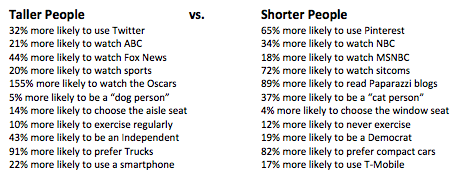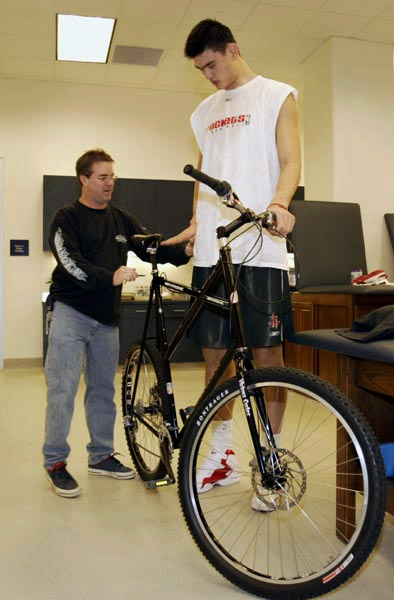loststar
Co-Founder
- Messages
- 2,704
- Points
- 113
- Height example: 6'2
- 5' 8
- CM Tall
- 173
- Shoe
- 9
Tall People Love Twitter, Short People Love Pinterest and Other Height-Related Epiphanies
Posted: 04/22/2013 1:20 pm
Here are two useful things I learned from our data scientists this week:
If you're short and you want a good view at a concert, check out a country music gig. There won't be many tall people there standing in your way.
If you're a big-and-tall retailer, advertise more on ABC. You'll have the best chance of reaching tall people there.
Random, right? Not really.
When mining all of our polling data, we find that certain questions are highly-correlated with almost every other question in our database. Age, gender, political ideology, race, and income are extremely common proxies for the brands we use, the TV we watch, or the types of household chores we like.
One attribute that shows up in nearly every experiment we run is height. Yes, height. How tall or short someone claims to be tells us tons of things about them. Let's first look at the full results:

What we see here is a classic bell curve. Naturally, the majority of people consider themselves average, with a roughly equal number considering themselves taller or shorter, respectively.
We do see nuances that throw off the curve, primarily associated with the respondents' gender.
Men are more likely to say they are taller than their peers. Women are more likely to say they are shorter. The brainiacs here call this "Aspirational Self-Disclosure." In English, it means that men believe they are taller because, perhaps, it projects a level of authority and attractiveness. Women, conversely, like to think they are somewhat shorter for some reason. In the end, we're not reporting on people's true height but, rather, their perception of their height.
Self-reporting biases aside, we find a number of traits that are highly correlated with height. Taller people, for example, tend to be better educated, more advanced professionally, and wealthier. Indeed, academic research on this topic would tell us that "heightism" is very common in American business. A remarkable number of Fortune 500 CEOs are over 6'3". Our data says that people who say they are "much taller" are 34 percent more likely to own their own business.
Sociologists explain the origins of heightism at childhood. A taller child is likely to be better at physical activities, helping them build confidence that manifests itself in the classroom. As taller people get older, they are more likely to catch a break from a college admissions officer because they're more 'memorable' or physically attractive. Studies show that when choosing between two equally-competent job candidates, an employer will choose the taller candidate 70 percent of the time.
These underlying factors lead to a number of other striking correlations. For example, there is an uncanny relationship between height and the brand of tablet someone owns. iPad users are 30 percent more likely to say they are at least "somewhat taller" than their peers. Kindle users are more likely to say they are "somewhat shorter." The "big" correlation is found among Android/Google tablet users, who are 85 percent more likely to say they are "much taller." This makes sense, as Android/Google users are the most likely of all tablet owners to be men.
We ran similar research on people who like to watch live concerts on television or online. People who said they were "much taller" were 61 percent more likely to say they watch live concerts "a lot." Why would this matter to TV programmers? For one, people who say they are somewhat taller or much taller, are much LESS likely to say they like country music. Tall people are also 52 percent more likely to say that social media influences the music they listen to "a lot."
A few other fun facts:

Overall, height is one of the most common proxies we find in any research we conduct. Try some of these insights on your tallest and shortest friends. You'll be right more often than not.
Posted: 04/22/2013 1:20 pm
Here are two useful things I learned from our data scientists this week:
If you're short and you want a good view at a concert, check out a country music gig. There won't be many tall people there standing in your way.
If you're a big-and-tall retailer, advertise more on ABC. You'll have the best chance of reaching tall people there.
Random, right? Not really.
When mining all of our polling data, we find that certain questions are highly-correlated with almost every other question in our database. Age, gender, political ideology, race, and income are extremely common proxies for the brands we use, the TV we watch, or the types of household chores we like.
One attribute that shows up in nearly every experiment we run is height. Yes, height. How tall or short someone claims to be tells us tons of things about them. Let's first look at the full results:

What we see here is a classic bell curve. Naturally, the majority of people consider themselves average, with a roughly equal number considering themselves taller or shorter, respectively.
We do see nuances that throw off the curve, primarily associated with the respondents' gender.
Men are more likely to say they are taller than their peers. Women are more likely to say they are shorter. The brainiacs here call this "Aspirational Self-Disclosure." In English, it means that men believe they are taller because, perhaps, it projects a level of authority and attractiveness. Women, conversely, like to think they are somewhat shorter for some reason. In the end, we're not reporting on people's true height but, rather, their perception of their height.
Self-reporting biases aside, we find a number of traits that are highly correlated with height. Taller people, for example, tend to be better educated, more advanced professionally, and wealthier. Indeed, academic research on this topic would tell us that "heightism" is very common in American business. A remarkable number of Fortune 500 CEOs are over 6'3". Our data says that people who say they are "much taller" are 34 percent more likely to own their own business.
Sociologists explain the origins of heightism at childhood. A taller child is likely to be better at physical activities, helping them build confidence that manifests itself in the classroom. As taller people get older, they are more likely to catch a break from a college admissions officer because they're more 'memorable' or physically attractive. Studies show that when choosing between two equally-competent job candidates, an employer will choose the taller candidate 70 percent of the time.
These underlying factors lead to a number of other striking correlations. For example, there is an uncanny relationship between height and the brand of tablet someone owns. iPad users are 30 percent more likely to say they are at least "somewhat taller" than their peers. Kindle users are more likely to say they are "somewhat shorter." The "big" correlation is found among Android/Google tablet users, who are 85 percent more likely to say they are "much taller." This makes sense, as Android/Google users are the most likely of all tablet owners to be men.
We ran similar research on people who like to watch live concerts on television or online. People who said they were "much taller" were 61 percent more likely to say they watch live concerts "a lot." Why would this matter to TV programmers? For one, people who say they are somewhat taller or much taller, are much LESS likely to say they like country music. Tall people are also 52 percent more likely to say that social media influences the music they listen to "a lot."
A few other fun facts:

Overall, height is one of the most common proxies we find in any research we conduct. Try some of these insights on your tallest and shortest friends. You'll be right more often than not.


